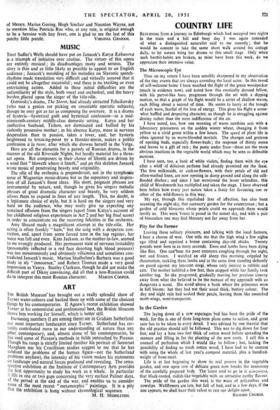MUSIC
THAT Sadler's Wells should have put on Janacek's Katya Kabanova is a triumph of initiative over routine. The virtues of this opera are entirely musical ; its disadvantages many and serious. The story is thin and as little likely as possible to appeal to an English audience ; Janacek's moulding of his melodies on Slavonic speech- rhythms made translation very difficult and virtually assured that it could not be altogether successful ; and there is no exciting or even entertaining action. Added to these initial difficulties are the unfamiliarity pf the style, both vocal and orchestral, and the heavy burden,placed upon the singer of the title-role. Ostrovsky's drama, The Storm, had already attracted Tchaikovsky (who nact a genius tor picking on unsuitable operatic subjects), thougn he only got as tar as composing the overture. It is a drama of hysteria—hysterical guilt and hysterical confession—in a mid- nineteenth-century middle-class domestic setting. Katya and her ineffective husband, Tichon, are dominated and bullied by his violently possessive mother ; in his absence Katya, more in nervous desperation than in passion, takes a lover, and, her hysteria heightened to breaking-point by a thunder-storm, makes a public confession a la russe, after which she drowns herself in the Volga.
Here are all the elements for a parody of Russian drama, in the manner of the old Riverside Nights, but hardly material for a three- act opera. But composers in their choice of libretti are driven by a wind that " bloweth where it listeth," and on this skeleton Janacek wrote music of penetrating beauty and originality.
The role of the orchestra is preponderant, not in the symphonic sense of Wagnerian music-drama but as the repository and inspira- tion of all Janacek's finest ideas. His short, poignant phrases are instrumental by nature, and, though he gives his singers melodic phrases of great dramatic character and beauty, he very seldom allows them to expand in lines of any length. This, no doubt, is a legitimate choice of style, but it is hard on the singers and very hard on the audience, who may easily give up expecting any sustained effusion from the singers (apart from Katya's account of her childhood religious experiences in Act '2 and her big final scene) in order to concentrate on the recurring felicities in the orchestra.
Amy Shuard made a magnificent attempt at the title-role. Her acting is often frankly " ham," but she sang with a desperate con- viction, and, apart from some forced tone in the top register, her voice was full and even. Kate Jackson, as the mother-in-law, seemed to me wrongly produced. Her permanent state of nervous irritability (presumably reflected in a red face denoting high blood pressure) was too monotonously and obviously villainous and sometimes con- tradicted Janacek's music. Marion Studholme's Barbara was a good study in sly " innocence," and Robert Thomas made a very good impression as Vanya. Stanley Clarkson, though he did not make the difficult part of Dikoy, convincing, did all that a non-Russian could
do to interpret this most Russian character. MARTIN COOPER.


































 Previous page
Previous page